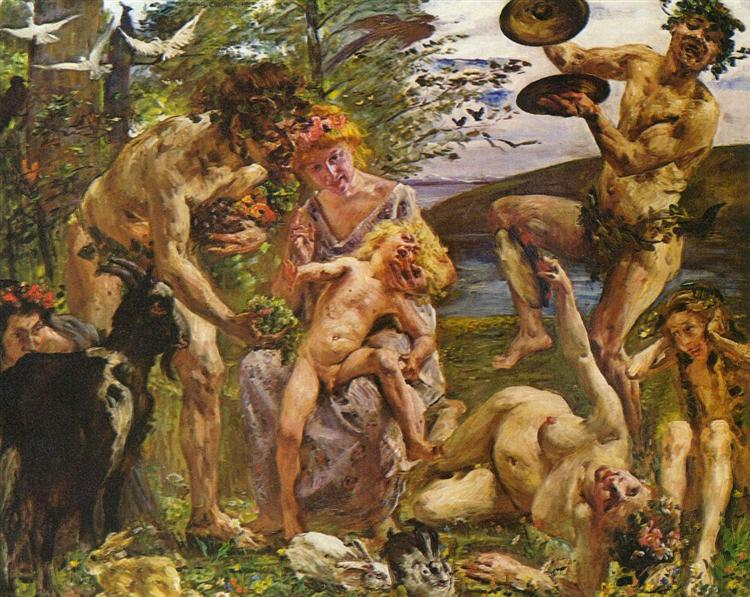Description
The work "El Niño de Zeus" (Die Jueus - 1905) by Lovis Corinth encapsulates a moment in which the fusion of the mythical and the human is presented in a moving and visceral way. Corinth, a prominent representative of German expressionism, uses his distinctive style to capture the childhood of the Greek god Zeus, which provides a unique approach to a mythical character. The representation of the young Zeus feels both monumental and intimate, showing Corinth's mastery when addressing issues of classical mythology with unique vigor.
The composition of the painting is remarkable for its dynamic balance. The young Zeus is in a natural environment, surrounded by elements that refer to his future divinity. His position and expression convey confidence and strength, characteristics that will define him in his life as God of Olympus. The work stands out for its disturbing combination of light and shadow, where the golden and warm shades of the background effectively contrast with the deep shadows that frame the child, almost suggesting a duality between its divine nature and its infant vulnerability.
As for the palette, Corinth opts for warm colors that evoke sensations of heat and vitality. Terracotta and golden tones are predominant, creating an almost celestial atmosphere of light, while the touches of blue and green in the environment add depth and freshness. This color game not only highlights the central figure, but also establishes a dialogue between the background and the foreground, which is essential for the visual narrative of the work. The loose and fastened technique used Corinth provides an almost tactile vibration to the surface of the paint, which invites the viewer to contemplate not only the scene, but also the vital energy contained in each brushstroke.
The treatment of the child's figure is of particular interest. Light insinuations of the duality of their future identity as God and human being, a child who will one day will be powerful and feared. Zeus's essence is insinuated in his marked facial features and in his determined look, gestures that seem to presage his destiny, in addition to a slight blur that suggests the agitation and conflicts of mythology. In this work Corinth transcends the mere portrait to enter the symbolic sphere, presenting a young man who is both vulnerable and enigmatic.
In addition, it is crucial to place Lovis Corinth within the movement of expressionism and modern painting of the early twentieth century. His work, often, explores the intersection between human emotion and the representation of reality; This is clearly reflected in "El Niño de Zeus". The influence of oil painting and the bold use of color in this work can also be compared to contemporaries such as Emil Nolde and Ernst Ludwig Kirchner, who also sought to capture the essence of their subjects more than a mere faithful representation.
The complexity of "El Niño de Zeus" lies in his ability to transcend time and space; While the Greek myths are in themselves a product of their era and culture, the way Corinth updates them and humanizes them resonates with the spirit of the twentieth century. This work is not only a portrait, but a contemplative dialogue about ascension to power, divinity and lost innocence.
In short, this painting is a jewel of artistic heritage, where the master Lovis Corinth manages to amalgamate classical mythology with a modern approach, producing a work that invites introspection and astonishment.
KUADROS ©, a famous paint on your wall.
Hand-made oil painting reproductions, with the quality of professional artists and the distinctive seal of KUADROS ©.
Art reproduction service with satisfaction guarantee. If you are not completely satisfied with the replica of your painting, we refund your money 100%.

